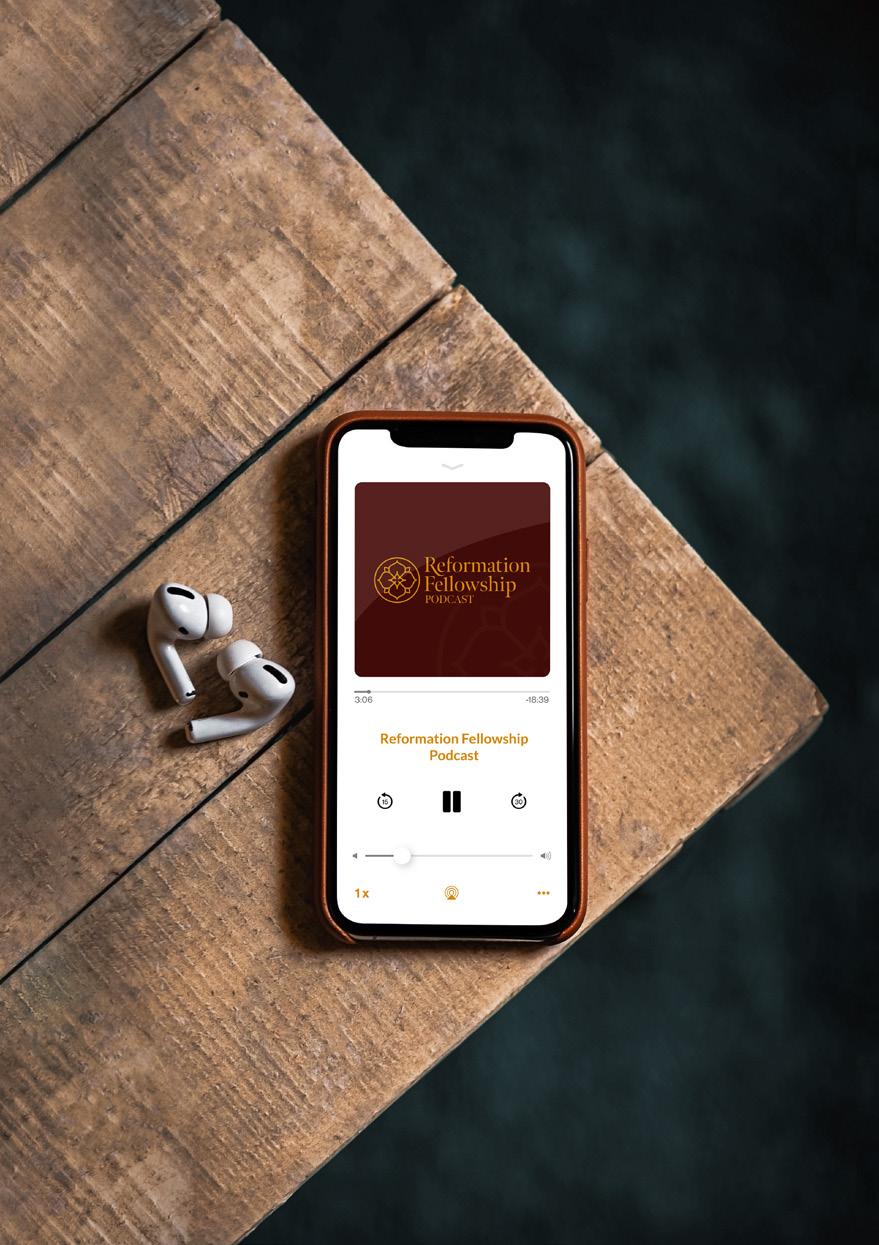The REFORMATION FELLOWSHIP Magazine
REGENERATION TERRY VIRGO
FROZEN STIFF NO LONGER: HOW THE SPIRIT SHOWS US THE BEAUTY OF CHRIST SAMUEL G. PARKISON
THE GOOD NEWS OF BEING LED BY THE SPIRIT OF ADOPTION DAN CRUVER

ISSUE 06 | 2023
Reformation Fellowship provides support and fellowship for all who would stand for the reformation of Christ’s church worldwide.
EDITORIAL BOARD
Michael Reeves
Daniel Hames
Joel Morris
Natalie Brand
Managing Editor: Chance Faulkner
Copy Editor: C. Rebecca Rine
DESIGN
Something More Creative® somethingmorecreative.com reffellowship.org
Reformation Fellowship is a ministry of Union Union Foundation, Bridgend, CF31 4DX
Registered Charity Number 517324
Unless otherwise indicated, all Scripture quotations are from The ESV® Bible (The Holy Bible, English Standard Version®), copyright © 2001 by Crossway, a publishing ministry of Good News Publishers. Used by permission. All rights reserved.
B ISSUE 06 | 2023
8 Terry Virgo REGENERATION
“In Christ’s resurrection from the dead, there began the new creation, and in God’s mercy we are part of it.”
18
Dan Cruver
THE GOOD NEWS OF BEING LED BY THE SPIRIT OF ADOPTION
“Redemption is not the climax of God’s work; adoption as sons is.”
40
Michael A.G. Haykin
“LOVE … GRASPS A WORLD, AND FLIES TO GOD”
“Love, that’s freed from vile Restraint, Love, that smiles on ev’ry Saint, Runs thro’ ev’ry heav’nly Road, Grasps a world, and flies to God.”
48 Aylin
Merck
WHY UNION WITH CHRIST IS SAVING MY LIFE
“I am learning to look at reality with faith eyes, knowing that the unseen is far more real than anything I can see.”
FROZEN STIFF NO LONGER: HOW THE SPIRIT SHOWS US THE BEAUTY OF CHRIST

“The Spirit removes the satanic veil of unbelief that we may see Christ with the eyes of faith, in all his splendour and loveliness.”
52 Christmas Evans THE PARACLETE
“The Holy Spirit has taken up his permanent residence among the people of God. ʻThat he may abide with you forever—for he dwells with you and will be in you.’ ”
26 Samuel G. Parkison
CONFERENCE 2023


FIND OUT MORE ABOUT OUR EVENTS AT REFFELLOWSHIP.ORG




A PRAYER TO THE HOLY GHOST 1767
 John Wesley, “A Prayer to the Holy Ghost” in Songs of the Spirit: Hymns of Praise and Prayer to God the Holy Ghost, ed. William Henry Odenheimer and Frederic M. Bird (New York: Anson D. F. Randolph & Company, [1871]), 364–365.
John Wesley, “A Prayer to the Holy Ghost” in Songs of the Spirit: Hymns of Praise and Prayer to God the Holy Ghost, ed. William Henry Odenheimer and Frederic M. Bird (New York: Anson D. F. Randolph & Company, [1871]), 364–365.
Kindler of seraphic fire

Glowing in Thy hosts above, Giver of the pure desire, Spirit of celestial Love, Heavenly love to us impart, Comfort every drooping heart.
If Thou hast a token given, If our want of love we feel, Bless us with that taste of heaven, Pardon on our conscience seal; Then with cordial charity, Gracious God, we cleave to Thee.
Then, because Thou first hast loved, We shall love our God again, Happy, till from earth removed, Joy consummate we obtain, Dazzled with the glorious sight, Lost in an abyss of light.
SPIRIT OF LOVE, RETURN 1767
 Charles Wesley, “Spirit of Love, Return” in Songs of the Spirit: Hymns of Praise and Prayer to God the Holy Ghost, ed. William Henry Odenheimer and Frederic M. Bird (New York: Anson D. F. Randolph & Company, [1871]), 368–369.
Charles Wesley, “Spirit of Love, Return” in Songs of the Spirit: Hymns of Praise and Prayer to God the Holy Ghost, ed. William Henry Odenheimer and Frederic M. Bird (New York: Anson D. F. Randolph & Company, [1871]), 368–369.
Spirit of Love, return To every troubled breast, And comfort us who mourn For permanence of rest: Thou dost Thy mourners’ steps attend, Our undiscovered Guide; But come, our grief and sin to end, And in our hearts abide.
With us residing here
We know Thee now in part, The Author of our fear
And all our hope Thou art. Thou often visitest Thine own: But in an hour or day Our transitory Guest is gone, Our joy is fled away.
How short, alas, our taste
Of those celestial powers, When, a few moments blest, We know that Christ is ours, That Christ hath quenched the wrath of God, His Fatherʼs Grace revealed, And bought our pardon with His Blood, And on our conscience sealed.
O might we always know The Father reconciled! Set up Thy throne below In each adopted child: Restore the Kingdom of Thy Grace, And fill us from above With purest joy, and perfect peace, And everlasting love.

REGENERATION
TERRY VIRGO

The creation of the human race was accompanied by an alarming warning. Humanity, though made in God’s image with a magnificent calling to fill, subdue, and rule over the earth as God’s representatives, was given clear instruction. The fruit of one particular tree was specifically and startlingly forbidden. If that fruit was eaten, death would follow.
Ensnared by Satan’s lies, tragically the first humans ate the outlawed fruit, and death immediately resulted. Fellowship with God was destroyed, and entrance to
Eden and God’s presence was shut off. From now on, thoroughly disqualified from God’s favour, human existence was in exile. Men came to birth, but the recurring phrase “and he died” dominates the early pages of Scripture (see Genesis 5). Paul teaches us “just as through one man sin entered into the world, and death through sin, and so death spread to all mankind, because all sinned” (Rom. 5:12, NASB). Although men and women walked the earth, they were “dead in … trespasses and sins” (Eph. 2:1). The plight of the human race seemed beyond hope.


Another Birth Is Needed
Early in the gospel story we are introduced to Nicodemus, a Jewish religious leader who, on approaching Jesus, was quickly told that if he were to see God’s kingdom, he would need a second birth. No amount of religious observance could meet his needs before a holy God. Only a new birth would qualify him. What was born of the flesh was only flesh. He needed to be “born of the Spirit” (John 3:6). Natural man was thoroughly disqualified. All are “sons of disobedience” (Eph. 2:2).
Following the failure and limitation of the Old Covenant, Jeremiah promised that God would provide a New Covenant (Jer. 31:33). Ezekiel added that God would “put a new spirit within you; and I will remove the heart of stone from your flesh and give you a heart of flesh. I will put My Spirit within you and cause you to walk in My statutes, and you will be careful to observe My ordinances” (Ezek. 36:26, 27, NASB 1995). External observation of God’s law had proved inadequate in producing a holy people. A completely new start was needed. Paul later argued that “if a law had been given that could give life, then righteousness would indeed be by the law” (Gal. 3:21).
Laws Were Inadequate
The law was holy and good, but it could not produce life. It communicated information. It told us how holy God is and what God required of his people, but acquaintance with the law was not adequate to make people holy. Paul
argued that it even exacerbated sin. Strangely, it motivated reaction and caused rebellion. He claims he was once alive apart from the law, but when the commandment came, sin came alive, and he died (see Rom. 7:9).
So, trying to produce holiness in fallen people by giving them the law proved to be unfruitful. Hebrews tells us that the law made nothing holy and was indeed only a shadow of things to come. A new and better covenant was desperately needed; a sovereign intervention from God to recover lost humanity was required—nothing less than a new birth. The human race, “dead in … trespasses and sins,” needed a radical, creative work of God.
Dead in Trespasses and Sins
Paul says that we were “walking” but were in fact the walking dead (Eph. 2:2). This death was manifested in the overwhelming power of forces far too great for us to overcome. First, “the course of this world,” the power of the culture, the passing age that holds sway over people cut off from God who had chosen to suppress the truth in unrighteousness and, professing to be wise, became futile in their speculations (Rom. 1:18–22). The culture has frightening power to squeeze us into its mould and force-feed us with poison, claiming it to be medicine for our good, exchanging God’s truth for a lie.
Second, not only the world’s culture but a powerful supernatural force, the prince of the power of the air, is at work in us. A hostile enemy of
11 THE REFORMATION FELLOWSHIP MAGAZINE
God is also our enemy. Sometimes coming as a roaring lion, other times as an angel of light, he is far too strong and deceitful for us.
Third, we have within ourselves an appetite for sin. Internal lusts of our own flesh provide a further battleground. These enemies of world, flesh, and devil are far too great for fallen man to overcome.
A New Creation
Only a new creation will prevail. As Jesus said, “You must be born again” (John 3:7). Another birth had to take place. As with our original birth, we are actually personally passive in this experience. It is God who, in spite of our death, “made us alive together with Christ” (Eph. 2:4). Though we are dead and unable to initiate anything, God powerfully calls us and makes us come alive, just as Jesus summoned Lazarus out of his tomb and out of his death.
As Peter puts it, God, “according to his great mercy,” has given us new birth (1 Pet. 1:3). This new birth comes with the preaching of the Word of God, so that we read regarding Lydia, “the Lord opened her heart to respond to the things spoken by Paul” (Acts 16:14, NASB). Paul was preaching, but God opened her heart to respond. Left to ourselves, “the natural man does not receive the things of the Spirit of God, for they are
foolishness to him” (1 Cor. 2:14, NKJV), but God opened her heart.
New Worldview and Freedom
Having opened her heart to the gospel, Lydia opened her home to the apostolic team and their gospel work. With her new birth came a new response of openness. So, the new birth does not simply change our belief system; it changes our lifestyle, our values, and attitudes. God begins to be at work in us to will and to do his good pleasure (see Phil. 2:13). A new energy becomes available. Formerly, while under the law, Paul testified that the “willing” to do good was in him, but the “doing” was absent (Rom. 7:18, NASB). He wanted to respond but had no ability. Terrible turmoil followed. Now he celebrates that God is at work in us both to “will” and to “do” (Phil. 2:13, KJV). The new birth provides not only new appetites but also new ability. The truth breaks in and sets us free to live a different lifestyle, empowered by the Spirit of God (see Rom. 8:1–4).
Union with Christ
All this comes from the wonder of our union with Christ. It is in Christ that we have been made alive (Eph. 2:5). We have been raised up with him (Eph. 2:6), so Peter celebrates and magnifies God’s grace: “Blessed be the God and Father of our Lord Jesus Christ, who according to His great
12 ISSUE 06 | 2023
“Though we are dead and unable to initiate anything, God powerfully calls us and makes us come alive, just as Jesus summoned Lazarus out of his tomb and out of his death.”
mercy has caused us to be born again to a living hope through the resurrection of Jesus Christ from the dead” (1 Pet. 1:3, NASB). As we were dragged down in Adam’s sin and death, so we have been raised to newness of life through Christ’s resurrection and triumph over death. We enjoy the spoils of his victory. We are partners with him in his conquest. His resurrection brings us new life.
A New Walk
Having been born afresh, we now need to learn to walk. No longer dead in trespasses and sins in which we formerly walked (Eph. 2:1, 2), now as “His workmanship, created in Christ Jesus for good works, which God prepared beforehand” (Eph. 2:10, NASB), we need to “walk in them,” no longer walking according to the course of this world (Eph. 2:2) but entering a new walk altogether.
It is not that we simply “let go and let God.” It is not that we simply let Jesus do it for us. The New Testament encourages us as new people to take appropriate action. Having received a new nature through the new birth, we are called to live out our new life. As new creatures, we are simply told not to present our members as instruments of unrighteousness (Rom. 6:13), so we don’t do it. We walk as new people.
In this new walk, the indwelling Spirit comes to our aid, stimulating fresh motives and granting fresh enabling. We are no longer simply left to ourselves with an external law urging us to conform. Ezekiel’s promise is that the Spirit within will “cause you to walk in my statutes” (Ezek. 36:27). He will empower. Paul added such a mighty promise, saying, “Walk by the Spirit, and you will not gratify the

13 THE REFORMATION FELLOWSHIP MAGAZINE
desires of the flesh” (Gal. 5:16). In the Greek, he actually uses what is called a double negative, something that English grammar forbids. It is emphatic. He forcefully promises us glorious freedom. We shall certainly not be overcome by the power of the flesh but enjoy the Holy Spirit’s releasing power. Fellowship with the Holy Spirit will bring everincreasing reformation to the heart. We are enabled to walk in newness of life (Rom. 6:4)—in newness of the Spirit, not in oldness of the letter (Rom. 7:6).
A New Slavery
The gospel promises true freedom, declaring us to be no longer slaves of sin. God has made us slaves of righteousness (Rom. 6:17, 18). We have been bought by Christ’s blood, ransomed out of our former slavery

and brought into his glorious slavery. Owned by a completely new master, we are his slaves: out of one bondage and into another! We are slaves of righteousness with a new ownership.
We were formerly darkness but now are light in the Lord (Eph. 5:8). We have a new identity, and an internal transformation has taken place.
A New Identity
We must never underplay the magnitude of our new birth, our being a new creation. Some believers insist on calling themselves “sinners,” while the Scripture consistently calls us “saints”—holy ones. Of course, we continue to fight with the world, the flesh, and the devil, yet not as those essentially still sinners but as those regenerated,
ransomed, and given new identity in Christ. If we insist on clinging to our unregenerate identity, we will find the battle so much harder. We are called to be holy as our Father is holy. If our identity is essentially “sinner,” our calling will prove nigh on impossible. A pig may be very happy to be called a pig, contented with his identity. But if he is then told that his calling in life is to fly, he will become a very unhappy pig. Pigs don’t fly.
We have been raised with Christ to newness of life. We share in his resurrection triumph. The spoils of his victory are ours to appropriate.
“Go tell my brothers” was his resurrection word (see John 20:17), not “go tell those pathetic failures.” He is not ashamed to call us brothers. We’ve been co-raised
with him, are now co-seated with him, and are co-heirs to eternal glory: all this because of his victory and his grace to us. He won the battle alone, but he shares freely his resurrection life.
Regeneration or new birth or new creation must be regarded as a radical life-change. We must beware of using language which we don’t take seriously. In Christ’s resurrection from the dead, there began the new creation, and in God’s mercy we are part of it. We are a kind of firstfruits celebrating the wonder of resurrection life. The whole creation is straining on tiptoe to see the full revelation of the sons of God. Meanwhile, let us celebrate the wonder of what he has done and live as the new creatures that he has made us.

Gospel-hearted training, wherever you need it.
We offer flexible degree programmes from BA to PhD to equip you for a lifetime of ministry and mission.
Enquire now by emailing admissionenquiries@ust.ac.uk

Validated by


16 ISSUE 06 | 2023

THE GOOD NEWS OF BEING LED BY THE SPIRIT OF ADOPTION
DAN CRUVER
All who are led by the Spirit of God are sons of God. For you did not receive the spirit of slavery to fall back into fear, but you have received the Spirit of adoption as sons, by whom we cry, “Abba! Father!”
ROMANS 8:14–15
18 ISSUE 06 | 2023
One of the great temptations we face each day as Christians is to live for the here and now. The world’s system (see 1 John 2:15–17) is always at work to keep us from setting our hope on our glorious future as the Father’s children. All of the world’s energy is devoted to seducing us into thinking that what we can experience now is ultimate.
The world wants us to live without eternity in view, to make decisions each day without reference to the glorious future that God has in store for us. If the world can get us to feel content with pursuing the “good life” here and now, it has effectively done its job. To borrow from C. S. Lewis, the world too often deceives us into thinking that we are now enjoying our “holiday at the sea,” that this present day is more to be desired than the future God has prepared for us.
Enter Romans 8. In what has been called the greatest chapter in all of Scripture, Paul informs us of what God has provided in order to protect us from the world’s seduction. The Father has graciously given us the “Spirit of adoption” (vv. 14–15). When we look at Romans 8:14–15 within the full context of Romans 8, we discover that God the Father sent the Spirit of adoption (“you have received the Spirit of adoption as sons,” v. 15, emphasis added) into our hearts, by whom we cry “Abba! Father!”, so that the Spirit might intensify our longing for the day when we will live on a renewed earth as the Father’s children. As we will see, “Abba! Father!” is a cry that leads us through the tempting wilderness of this life (Hebrews 3–4) into the glorious future when “the earth shall be full of the knowledge of the L ord as the waters cover the sea” (Isa. 11:9).
First Things First
Before we consider the way Romans 8:14–15 reveals how the Father’s provision of the Spirit of adoption actually protects us from the seduction of the world, let’s look at how the word “adoption” functions within the Scriptures.
Paul is the only writer in Scripture to employ the term “adoption,” and he does so five times in four separate passages (Eph. 1:4–5; Rom. 9:4; Gal. 4:4–6; Rom. 8:14–15,

19 THE REFORMATION FELLOWSHIP MAGAZINE

23). Looking at each passage in turn transports us to four crucial events in the grand story of redemption.1
Before Time: Ephesians 1:4–5

In this passage, Paul states that God the Father “chose us in [Christ] before the foundation of the world, that we should be holy and blameless before him. In love he predestined us for adoption to himself as sons through Jesus Christ.” Thus, we see that God’s first work of adoption happened even before he created the universe. God did this, Paul emphasises, “in love.” Before the first molecule was formed, God marked us out with incomparable care—he predestined us—for the great privilege of being his beloved children through adoption. Adoption was not a divine afterthought. It was in God’s triune mind and heart before the first tick of human history’s clock. Adoption, therefore, predates the universe itself.
Israel: Romans 9:4
Here, Paul identifies adoption as one of the great privileges Israel enjoyed as God’s chosen people: “They are Israelites, and to them belong the adoption, the glory, the covenants, the giving of the law, the worship, and the promises” (emphasis added). Scholars believe that Israel received adoption—that is, officially became God’s corporate son—when God declared them a nation at Mount Sinai, three months after he delivered them from Egypt. Thus, God redeemed them before he adopted them. To put an even sharper point on it, God redeemed them in order to adopt them. Israel’s redemption preceded its adoption.
Of course, Israel repeatedly failed in its adoptive sonship by rejecting the Father’s love, thus replaying the story of Adam’s rebellion. God’s mission to bring many wayward and rebellious sons home to glory seemed doomed. Yet through Israel (God’s corporate son through adoption), the eternal and perfect Son would be sent to redeem humanity, thereby preserving God’s perfect plan.
21 22–
1 The following section detailing Paul’s use of the term “adoption” is adapted from Reclaiming Adoption: Missional Living Through the Rediscovery of Abba Father (Minneapolis, MN: Cruciform Press, 2011).
Jesus: Galatians 4:4–6
“When the fullness of time had come, God sent forth his Son, born of woman, born under the law, to redeem those who were under the law, so that we might receive adoption as sons” (emphasis added). Here, Paul identifies adoption as the grand purpose or objective of redemption, and he could not have written it more clearly: “... so that we might receive adoption”! Once again, adoption shows up at a watershed moment within the unfolding story of redemption. Just as God redeemed Israel in order that he might adopt them, so also has God redeemed us in order that he might adopt us! Redemption is not the climax of God’s work; adoption as sons is.
New Heavens and New Earth: Romans 8:14–15, 22–23

Finally, adoption is central to the happy ending of redemption’s story. In Romans 8:23, Paul writes, “And not only the creation, but we ourselves, who have the firstfruits of the Spirit, groan inwardly as we wait eagerly for adoption as sons, the redemption of our bodies” (emphasis added). Paul identifies the glorification of our bodies as a final, outward manifestation of our adoption. When the story of redemption reaches its intended goal, the Bible calls it “adoption.” On that climactic day, the heavens and the earth will be transformed into our Father’s house. The renewed earth will become the place where we forever enjoy our Father’s love as his dear children. Paul’s use of adoption in Romans 8 teaches us that Christian living is not directionless living. Christians are those who daily fix their eyes on the climax of God’s work of adoption— the renewed heavens and earth.
So, we see that Paul teaches that God does not merely redeem us—through adoption he brings us into the warmth, love, and gladness of his own family. Redemption was never intended to be God’s “be-all and end-all” work of grace. God redeemed us in his Son so that he might love us and delight in us even as he loves and delights in his eternal Son. Adoption is God’s act of making room within his triune love for sinners who are without hope and providing them with homes in this world and in the world to come. This is the story of adoption.
22 ISSUE 06 | 2023

23 THE REFORMATION FELLOWSHIP MAGAZINE
Back to Romans 8:14–15
In Romans 8, the “Abba! Father!” cry (v. 15) is surrounded by strong Exodus imagery. The Old Testament story of God’s deliverance of Israel out of Egyptian bondage is the story that echoes behind the Grand Story of Romans 8. We find evidence of this fact all through the chapter: “set you free” (v. 2); “led by the Spirit of God” (v. 14; see Exod. 13:21); “the spirit of slavery” (v. 15); “subjected to futility” (v. 20); “will be set free” (v. 21); “bondage to corruption” (v. 21); “obtain the freedom” (v. 21); “groaning together” (v. 22; see Exod. 2:23); “redemption” (v. 23); and “firstborn” (v. 29; see Exod. 4:22). 2
If you recall, one of Israel’s great struggles after God delivered them from Egypt was the temptation to return to Egypt. Yes, God’s deliverance opened up a whole new world and future for them (i.e., the opportunity to enjoy being God’s children in the Promised Land, a second Eden of sorts), but Egypt was the only “world” they knew.

As great as God said the Promised Land was, it was still an unknown commodity as far as they were concerned. Getting to this second Eden required that they continue to believe and follow the God who delivered them. And for people who are prone to forget God’s great deeds (see Ps. 106:21), believing is not easy, especially when it means defeating giants. Thus, while Egypt worked to seduce Israel with its promise of familiarity and predictability, the people also repeatedly forgot God their Saviour—the God who delivered them from the “mighty” Egyptians. That is a dangerous combination.
So, what did God do? He graciously continued to lead them “by day in a pillar of cloud to lead them along the way, and by night in a pillar of fire to give them light, that they might travel by day and by night” (Exod. 13:21). These pillars not only reminded Israel on a daily basis that God had redeemed them from Egyptian bondage with his outstretched arm, but they also led them forward to the land of their inheritance as God’s
2 Paragraph adapted from Dan Cruver, “The First Step in the Way Forward: A Response to David M. Smolin’s ʻOf Orphans and Adoption’,” Journal of Christian Legal Thought, vol. 2, no. 1 (Spring 2012): 13.
24 ISSUE 06 | 2023
firstborn son. The pillar of cloud by day and the pillar of fire by night led Israel away from Egypt’s seduction into the glorious future that God had prepared for them.
Crying into the Future
As I mentioned earlier, the “Abba! Father!” cry of Romans 8:15 is surrounded by strong Exodus imagery. Just as God led Israel, his son by adoption, into the future he had prepared for them, so too he now leads us by the Spirit of adoption toward our promised inheritance (Rom. 8:14–15). When by the Spirit of adoption we find ourselves crying, “Abba! Father!”, we show that we are groaning for the day when “the earth shall be full of the knowledge of the L ord as the waters cover the sea” (Isa. 11:9). The simple yet profound heart-cry “Father!” is evidence that we are finding the seduction of the world lacking.
As Paul writes in Romans 8:23, we, “who have the firstfruits of the Spirit, groan inwardly as we wait eagerly for adoption as sons, the redemption of our bodies.” By the Spirit of adoption God is leading us to long increasingly for the day when the entire earth will become our happy home, to be enjoyed with God our Father and our Elder Brother, Jesus. Paul calls this great day our adoption!
Be encouraged: even the faintest “Abba! Father!” cry in our hearts by the Spirit of adoption is evidence that we are actually beginning to imagine “what is meant by the offer of a holiday at the sea.”3 We are learning not to be easily pleased. That’s good news for Christians in this age of temptation.

25 THE REFORMATION FELLOWSHIP MAGAZINE
3 C. S. Lewis, The Weight of Glory (San Francisco, CA: HarperOne, 2001), 26.
FROZEN STIFF NO LONGER: HOW THE SPIRIT SHOWS US THE BEAUTY OF CHRIST
 SAMUEL G. PARKISON
SAMUEL G. PARKISON

For as long as I have been a Christian, I have been haunted by questions surrounding the Holy Spirit. Perhaps this is owing to my charismatic background, having grown up in a church wherein the gifts of the Spirit played a regular, if not innocuous, part. The continuation of the Spirit’s gifts as described in 1 Corinthians 12–14 was simply taken for granted, and so I took them for granted.
And yet for all its apparent ordinariness—for all its being assumed in my environment— the Spirit’s continual ministry in the church today never sat as comfortably with me as it seemed to sit with my pastors and fellow church members. I speak of being “haunted” by questions surrounding the Spirit for a reason. His ministerial presence was, and is, a fearful mystery to me, inspiring dread and concern and timidity and delight and desire. Just like with the Holy of Holies, I have always longed to enter into his mysteries, and yet have feared what I would find there. There is a kind of darkness to this illuminating Fire—this Wind, this divine Breath, this Paternal and Filial Love, this unnerving and convicting Comforter—which draws our heartfelt contemplation even while demanding for us to remove our shoes (cf. Exod. 3:5).
Growing in faith and understanding over the years has refined those haunting questions but has by no means eradicated them. They do not abate; they intensify. What does it mean to “[pray] in the Holy Spirit” (Jude 20)? Is there a difference between the gift of tongues (1 Cor. 13:1) and the gift of languages (Acts 2:5–12)? What am I to do with the fact that some figures we would identify as cessationists throughout church history do not sound like it?
What am I to do with the fact that contemporary conversations about the spiritual gifts are indelibly determined by
sectarian, misguided, and crude-biblicist Pentecostal movements that began at the turn of the twentieth century? On the one hand, I want nothing to do with such movements—with their talk of “second baptisms,” their insistence on the need for everyone to speak in tongues (contra Paul’s clear instructions in 1 Corinthians 12:4–7), and their inclination toward Socinian-like heresies. Keep me formally connected to the “one holy catholic and apostolic church” via creeds and confessions—that’s what I say! On the other hand, what am I to do with the fact that contemporary cessationist responses to the charismatic movement—arguing for the superfluity of certain spiritual gifts—remain decidedly unconvincing to me? Count me out of exegeting 1 Corinthians 13 in such a way that the canonisation of the Scriptures amounts to the beatific vision.
So where does that leave me?1 What am I to do with the fact that I think my own continuationist views are not incompatible with the 1689 London Confession of Faith (particularly chapter 1, paragraph 1, where the authors write “the Holy Scriptures” are “most necessary,” and that “those former ways of God’s revealing his will unto his people being now ceased”), despite what other 1689ers keep telling me? Perhaps this is a cry for help.
The Spirit: A Profound Mystery’s Resolution
But lest this therapy session last longer than it ought, I wish to bring up one mystery that the haunting topic of the Holy Spirit does not raise, but rather helps us solve. For all the conundrums the Holy Spirit’s person and work creates, there is one his person and work simply resolves: How does the blind and hardened and indifferent sinner come to see the truly irresistible beauty of Christ?
28 ISSUE 06 | 2023
1 See, for example, chapter 5 of Andrew Wilson’s Spirit and Sacrament: An Invitation to Eucharismatic Worship (Grand Rapids, MI: Zondervan, 2018).

Behind this conundrum lie two realities that are equally consequential. The first is that Christ is the most beautiful man ever to exist because he reveals the beauty of the triune God, which is archetypical, transcendent, perfect Beauty. The second reality is that although man has been created as a glory-hungry, Beauty-craving creature, and should thus find in Christ the satiation of all his desire forever, he nevertheless all-too-often finds Christ boring at best and repugnant at worst. And this is because of the soul-deadening presence of sin.
In the normal and tragic state of affairs, Christ stands before his creatures as the most beautiful and satisfying object they could dream of, offering fullness of joy and pleasures forevermore (cf. Ps. 16:11), and his creatures trifle with pitiful and putrid idols. “He came to his own, and his own people did
not receive him” (John 1:11). This is because his own people are dead in their trespasses (Eph. 2:1, emphasis added).
Now, I understand that what you just read was a mouthful, so before describing how the person and work of the Spirit solves the conundrum of conversion, let me say a little bit more about beauty and how Christ reveals divine Beauty to us.

On Beauty and the Beautiful Christ
Let’s start with our experience of beauty. When you see a beautiful painting or hear a beautiful song, the beauty does not originate in you. Beauty isn’t found in the organ of perception (your eyes or your ears), nor in the sensation of perceiving (seeing or hearing). Of course, you have been told that this is precisely where it does originate. “Beauty is in the eye of the beholder,” you have been catechised to say.
30 ISSUE 06 | 2023
But it seems to me that if Beauty does anything, it belies this notion. You know it’s not true, don’t you? Beauty does not ask for your permission to compel your delightful reverence. It beckons. It thrusts itself upon you, and it pulls you toward the object it adorns, and even beyond those objects (after all, has anyone ever enjoyed the experience of beauty and said, “Okay, that’s it. I do not need or desire any more beauty”? Of course not; we only move beyond the experience because other needs impose themselves on our attention, or because the object that aroused our desire for beauty fades and loses its lustre, etc.). Beauty stands objectively outside all of these surface-level categories and is the quality with which these categories interact. In other words, when you experience something beautiful, it is participating in the transcendental reality of Beauty.
Now, you may have never taken a philosophy class, but if you have—and if you paid attention—this should remind you of the ancient Greek philosopher Plato. Plato insisted that apart from and outside of the material world in which you and I live, there is a world of “forms” or “ideas.” We see various trees on this planet, for example, but all of those trees are imperfect, shadowy participants in the true form of treeness—the Platonic ideal of the Perfect Tree—which exists in an immaterial world. Most theologians in the history of the church—with Augustine and those who have followed his thought as a particularly clear example—have insisted that Plato is right to see a relationship between the beauty we experience and its Source, but that he was wrong about the Source. Earthly beauty is a revelation of true Beauty, but true Beauty isn’t some abstract concept of the ideal; it is, rather, Godʼs splendour.

31 THE REFORMATION FELLOWSHIP MAGAZINE

This is why it is accurate to identify all three of these transcendentals (Truth, Goodness, and Beauty) as essentially one. That’s one of the insights that Christianity rightly praised in the Platonic tradition, even though the Platonists could not account for the origin of that unity. The ultimate True is the ultimate Good and Beauty, and so on. But in the hands of Christians, this conviction wasn’t simply stated; it was sung. If the ultimate Source of all these transcendentals is found in the God who is simple, it should not surprise us at all to find goodness to be beautiful, and truth to be good and fitting and lovely. All of our experiences with these realities are pointing us to God, because these transcendental realities are ultimately found in him. Beauty is recognised subjectively, but this does not mean that Beauty is itself subjective. So our understanding of beauty begins below—when beauty thrusts itself upon us and we are compelled by it.
Our experience of beauty begins below, yes, but we mustn’t stay there. The beauty we experience in creation has the purpose to direct our attention to the God who is Beauty. Again, the Platonists recognised this to a degree. They knew that all this earthly beauty was pointing beyond itself. They knew that the cosmos was enchanted—or, when they were at their most distraught by their existential blindness, they might say haunted. Reality meant more than it was. The referent of every earthly beauty was more than the material form that occasioned its recognition.
The early Christians recognised the angst of the philosophers—they saw in the philosophers’ musings questions that they had the answers to, not because they were so much wiser than the philosophers, but because those answers were thrust upon them in dramatic fashion. The upshot of this is that, for the early Christians, the cosmos pulsates with life and meaning. Unlike for the
Platonists, for the Christian, creation is good not despite its physical form but precisely as physical. It is good because it is formed in the good mind of the all-good God. The material universe is not good despite its physical form; its physical form is itself good. But its physical form does not exhaust its essence.
And so the early Christians were able to answer questions the philosophers never even knew they had. Where do we learn about this “from above” beauty—this divine Beauty? Where do we learn about God’s glory, which he displays through the creation that captivates us?
The answer is: in Holy Scripture. If the final word on beauty doesn’t rest on the Scriptures, it is incomplete—again, our understanding of beauty begins “from below,” but it cannot stay there. It’s not supposed to stay there. It points us heavenward, to the God who reveals himself in Scripture. “The heavens declare the glory of God, and the sky above proclaims his handiwork,” says the psalmist (Ps. 19:1). Creation’s beauty, in other words, is bragging about God. Day and Night shout out, “Hey! See how beautiful we are? God made us; isn’t he amazing?” On this passage, the fourth century church father Gregory of Nyssa writes:
For we can hear as it were words teaching us: “O men, when ye gaze upon us and behold our beauty and magnitude, and this ceaseless revolution, with its well-ordered and harmonious motion, working in the same direction and in the same manner, turn your thoughts to Him Who presides over our system, and, by aid of the beauty which you see, imagine to yourselves the beauty of the invisible Archetype!”2
33 THE REFORMATION FELLOWSHIP MAGAZINE
2 Gregory of Nyssa, “Against Eunomius,” in Select Writings and Letters of Gregory, Bishop of Nyssa, ed. Philip Schaff and Henry Wace, vol. 5, A Select Library of Nicene and Post-Nicene Fathers of the Christian Church, 2nd ser. (Grand Rapids, MI: Eerdmans, 1954), 272–273.
Beauty par excellence is none other than God himself. So, if Jesus Christ—the incarnation of the eternal Son of God—is the revelation of the divine, he is the ultimate manifestation of divine Beauty. Archetypical beauty has taken human form. And he has done so for our benefit—he has made absolute Beauty accessible to us! I love how Athanasius puts this:
For since human beings, having rejected the contemplation of God and as though sunk in an abyss with their eyes held downwards, seeking God in creation and things perceptible, setting up for themselves mortal humans and demons as gods, for this reason the lover of human beings and the common Savior of all, takes to himself a body and dwells as human among humans and draws to himself the perceptible senses of all human beings, so that those who think that God is in things corporeal might, from what the Lord wrought through the actions of the body, know the truth and through him might consider the Father. 3
The person of Christ is no less than his human nature. That human who lived and died and rose and ascended and will one day return really is Christ, the second person of the Trinity. He is human, yes, and he is infinitely more. His person is truly human in nature, but his person is not circumscribed by his human nature. Christ exceeds.
This is why you should feel absolutely no embarrassment or shame in reading through the Gospels while worshipping Jesus Christ, the man—son of Mary, brother to James, cousin to John, eater of fish, drinker of wine— this man who said things and felt things and did things with his hands. You should feel absolutely no embarrassment about longing
to hug his resurrected body with your resurrected body—and feel no embarrassment about longing for the day when you can look into his human eyes and say “thank you” and watch his human lips curl into a human smile. In case you’ve forgotten, the incarnation is an ongoing reality. The second person of the Trinity is and will forever be the God-man, Jesus Christ, because we will always and forever need that kind of accommodation!
Blind to Beauty
And yet a human being—in his natural and dead state—does not and cannot recognise the heart-stopping beauty found in Christ. His soul is dead to what is truly delightful. Now, this does not mean that his soul is devoid of desire. To lack desire is to lack humanity; this is irreducible and inescapable. The crucial question comes down to where that desire terminates. If one attempts to terminate these desires on “not God,” they begin to break down and malfunction. The desperation of the idolater’s position can thus be summarised in the following syllogism:
Premise A: An image-bearer is created to instinctively worship that which he considers (among other criteria) beautiful.
Premise B: An image-bearer’s chief end is to worship God, who is alone supremely beautiful (and more specifically, to worship Christ, the incarnation of God).
Premise C: God’s judgement of idolatry is to give the offender over to idolatrous acts more and more (cf. Rom. 1:24–25), to the end that the idolater’s perception of God’s beauty is blinded.
Conclusion: Therefore, an image-bearer who engages in idolatry is doomed: he cannot cease his idolatry (Premises A and C) and thus cannot live out his chief end (Premise B).
Because of sin, man’s faculties to recognise Jesus’ supreme beauty are broken, and their continued exercise to behold and adore
34 ISSUE 06 | 2023
3 Athanasius, “On the Incarnation,” trans. John Behr (Crestwood, NY: St. Vladimir’s Seminary Press, 2011), 15:65.
objects of lesser loveliness (i.e., idols) only exacerbates and further corrupts those broken faculties. The more a person beholds the lesser loveliness of idols, the more he is unable to behold the supreme loveliness of Jesus. This is the hopeless situation fallen humanity finds itself in. And the fact that anyone in this situation can come to recognise Christ as beautiful as he actually is is a deep mystery—a mystery that, again, the Holy Spirit—his person and work—helps us solve.
How so? Well, Paul describes this event as a kind of “unveiling” in 2 Corinthians 3:12–18. The Spirit removes the satanic veil of unbelief that we may see Christ with the eyes of faith, in all his splendour and loveliness. There we were, cold and indifferent to Christ, worshipping our horrid and putrid idols. What we thought were treasures were actually filthy, festering, decaying, rotting objects that should have elicited dry heaving. And yet in
the darkness of our sin and despair, we were deceived. But the Holy Spirit—the illuminating glory-cloud of the divine Trinity—turned the lights on, simultaneously giving us the first good look at our sad accommodations and the first good look at Christ!
Thawing the Frozen Stiff: The Holy Spirit’s Miraculous Work
And yet, as amazing as this ministry of the Spirit is, we can wring even more amazement out of this theological exercise of contemplation when we think hard about how the Spirit does this work. He does not “flip the light-switch on,” so to speak, from a distance. No, the Spirit himself is the illumination we need! It is his own indwelling and renovative presence that gives us the eyes of faith to see Christ’s Beauty.4 Consider

35 THE REFORMATION FELLOWSHIP MAGAZINE
4 The foregoing paragraphs include material taken from my forthcoming book Irresistible Beauty: Beholding Triune Glory in the Face of Jesus of Christ (Ross-shire, Scotland: Christian Focus, 2022).
how the church father Basil the Great puts this point:
When through his illuminating power we fix our eyes on the beauty of the image of the unseen God, and through the image are led up to the more than beautiful vision of the archetype, his Spirit of knowledge is somehow inseparably present. He supplies to those who love to see the truth the power to see the image in himself. He does not make the manifestation from the outside, but in himself leads to knowledge. 5
In regeneration, the Spirit communicates to us the glorious beatitude—the selfhappiness—of God himself! And by saying “communicates,” I do not mean to cast any doubts on this activity of incorporating us into the divine and love and happiness of the Trinity—as if the Spirit extends a kind of invitation for us to get in on God’s selfhappiness which we may or may not accept. No, this “communication” is effective. His own indwelling presence sovereignly brings us into participation of divine beatitude: since he has given us eyes to see the irresistible Beauty of Christ, we cannot but cling to him by faith.
And in doing so, the Spirit, in his own miraculous person and work, ushers us into the ocean of endless Trinitarian love. I could not put this point better than the church father Gregory of Nyssa if I tried, so I will rest my case with his words here:
There was a time when humanity was frozen stiff by the chill of idolatry because the changeable nature of human beings had been altered to conform to that of unchangeable idols ... For just as those who look upon the true Godhead take to
themselves the characteristics of the divine nature, so too the person who is devoted to the vanity of idols is transformed into the stone he looks upon and becomes other than human. Since, then, once it has been petrified by the worship of idols, human nature cannot be changed for the better because it is frozen stiff by the chill of idolatry, the Sun of Righteousness rises upon this harsh winter and brings the spring of the Spirit, which melts such ice and, as its rays rise up, warms everything that lies beneath it. So it is that the person who has been petrified by the frost, once warmed by the Spirit and heated by the ray of the Word, again becomes water that springs up to life eternal.6
While there remain many mysteries, then, surrounding the person and work of the Spirit, let us not fail to appreciate one of the most profound mysteries that the Spirit actually solves. He makes the impossible actual. He turns the stony heart to flesh. He opens the blind eyes. He takes senseless and stupid creatures who shun and ignore and reject their greatest need and turns them into rightful worshippers. He helps us to see the Beauty of Christ.
36 ISSUE 06 | 2023
5 St. Basil the Great, On the Holy Spirit, trans. Stephen Hildebrand (Crestwood, NY: St. Vladimir’s Seminary Press, 2011), 18:47.
6 Gregory of Nyssa, Homilies on the Song of Songs, trans. Richard A. Norris Jr. (Atlanta: Society of Biblical Literature, 2012), 5:159–161.

Go Deeper with Union
Discover books, articles and free resources to help you delight in God, grow in Christ, and serve his church at unionpublishing.org

NEW FROM UNION
Come and See: A History and Theology of Mission, Justin Schell & Glen Scrivener
Exploring how God’s nature informs mission and surveying the missional narrative of Scripture, Come and See lays a theological and biblical foundation for Christian mission, inviting you to savor and participate in the grand story of God’s mission that begins in Genesis and continues today.
Available at unionpublishing.org
38 ISSUE 06 | 2023 NEW RELEASE
COMING SPRING 2023
Priscilla, Where Are You? Natalie Brand
Who was Priscilla, and what can we learn from her today? You will meet Priscilla in Acts 18, where, with her husband, she is intentionally engaged in, and sharing, sound Christian doctrine. This is the privilege of every
believing woman: we can explore truth and revel in God’s mysteries; we can live as God intended, with real spiritual strength and heartfelt praise. And we too will want to share our discoveries with others. So why are we content to paddle in the shallows when we could be going in deeper? The author is passionate about encouraging other women to share “joyful theology” with others and so prove useful in serving the wider church. Don’t settle for less!

Pre-order available at unionpublishing.org
COMING SOON
“LOVE … GRASPS A WORLD, AND FLIES TO GOD”: 1
Two Hymns to the Holy Spirit by Richard Burnham
MICHAEL A.G. HAYKIN
One of the great affirmations of the evangelical tradition has been a consistent emphasis that regeneration and revival are the sovereign work of the Spirit. As D. Martyn LloydJones rightly says: “There is no doctrine which shows us quite so clearly our utter and complete helplessness and hopelessness as [the] particular teaching concerning the work of the Holy Spirit in the application of redemption to us” in both individual conversion and in revival.2
Numerous examples of this great re-creative work of the Holy Spirit in the annals of the church’s history could easily be cited, but one that has recently been on my mind is the conversion of Richard Burnham (c. 1749–1810) of High Wycombe, Buckinghamshire, during the revival of the Particular Baptist community in the late eighteenth century.
1 This essay is taken from the author’s forthcoming book “Holy Spirit, now descend”: Thomas Davis, His Friends, and the Evangelical Revival, Evangelical Lives, vol. 1 (Brighton: Ettrick Press, 2022).
2 D. Martyn Lloyd-Jones, Godʼs Ultimate Purpose: An Exposition of Ephesians 1 (Grand Rapids, MI: Baker, 1978), 351.
Out of a life of dissipation and debauchery, Burnham was led by the Spirit to genuine usefulness in God’s kingdom. After a brief introduction of Burnham, we look at two of his hymns on the reviving work of the Holy Spirit.
Encountering the Holy Spirit
When Burnham first sat under the preaching of the Welsh evangelical minister Thomas Williams in the parish church in High Wycombe in 1770, his preaching made little impression on Burnham. But there came a day when the Welsh preacher spoke of the “sufferings of Christ,” Burnham recalled in the year of Williams’ death some seventeen years later, and “my heart was sweetly broken by [the] divine power [of the Holy Spirit], and I felt the most ardent breathings after the Saviour.”3 Lacking assurance of his salvation, though, Burnham struggled for a considerable amount of time. He wrongly believed that
3 Richard Burnham, The Triumphs of Free-Grace (London: W. Smith, 1787), 97–98. On Burnham, see Thomas Wright, Richard Burnham, The Pocket Series of the Lives of the British Hymn Writers (London: Farncombe & Sons, [1910]).
40 ISSUE 06 | 2023
JANUARY 2023 | ISSUE 05
his salvation was not genuine because he had been drawn to Christ out of love for the Saviour and had not experienced “the deep horrors of soul” that many claimed they went through before conversion.
So Burnham entertained what he later called “strange notions”—namely, that assurance would come via “a kind of vision, in which I should see Christ in an extraordinary way, even with my bodily eyes.” Often late at night he would venture out to a wood or a field, or even sit “under a hedge,” and wait for such “a clear revelation of Christ.” None came, and in time he came to see that looking for such a vision was a delusion. Rather, it was as he sat under the Word that he was “brought by gradual light to understand that all my peace, even assurance, and the happiness connected with it, with all spiritual blessings, were to be enjoyed in a way of believing.” And he also came to realise that his salvation was no less real for his having been drawn to Christ by the display of Christ’s love for him on the cross.4
Although others soon recognised God’s call on Burnham’s life to preach and frequently invited him to do so, Burnham doubted that he was called to such a ministry. He later noted that he had “a strange fear … that the minister under whom I was awakened”— namely, Thomas Williams—“would censure me for spiritual pride.” This latter fear was dispelled when he went to visit Williams— “my spiritual father,” as he called him—and Williams told him that he had long had the impression God intended Burnham to be a gospel preacher.5
Subsequently, Burnham came to Baptist convictions and was called to the pastorate. He was formally ordained on April 21, 1778,
4 Burnham, Triumphs of Free-Grace, 97–105.
5 Burnham, Triumphs of Free-Grace, 107–108.
and that year began his first pastorate at Staines-upon-Thames. But the members of the Staines church were desperately poor and unable to support Burnham as their full-time pastor. Thus, when some London friends who admired his talents indicated that they would fund his ministry in London, Burnham left Staines for a London pastorate on the Surrey side of Blackfriars Bridge. This pastorate was later situated in a number of locales, eventually ending up on Grafton Street, Soho, in 1795.
“To the Holy Ghost”
While living at Staines, Richard Burnham had begun writing hymns. He probably employed some of these hymns in the worship of his Baptist congregation at Staines. But his first venture into print as a hymn writer came three years after leaving Staines for London. That year he published his New Hymns on Divers Subjects, which contained 141 hymns. Successive editions more than tripled that number. The final edition, the fifth, which appeared in 1803, contained 452 hymns.6 In the second edition of this hymnal, which appeared in 1785, there is a hymn entitled “To the Holy Ghost,” which well captures the spirit and ethos of the Evangelical Revival:
Thou Holy Spirit, breathe
Thy quickʼning powʼr impart, Thine heavʼnly Unction give, And warm the frozen Heart; Now let us feel thy sacred Fire, And evʼry Soul with Love inspire.
Conquer the Powʼrs of Hell, Break down the Walls of Sin; And let us ever feel Thy Residence within; Let us enjoy thy sacred Fire, And evʼry Soul with Love inspire.
6 For these details and other pertinent reflections on his hymnody, see “Burnham, Richard” in John Julian, A Dictionary of Hymnology, rev. ed. (London: John Murray, 1907), 196.
41 THE REFORMATION FELLOWSHIP MAGAZINE

Burst from thy burning Throne, And make the Devils fly, Breathe evʼry Evil down, And we shall mount on high; Now may we feel thy sacred Fire, And evʼry Soul with Love inspire.
Breathe Darkness all away, Let Light and Life be givʼn; And breathe us into Day, And breathe us into Heavʼn; There we shall feel thy sacred Fire, And all thy glorious Grace admire.7
The first three stanzas stress the need for the Holy Spirit to sovereignly triumph over “the frozen Heart” of unbelief, indwelling sin, and demonic assaults. Each of these stanzas ends with a similar refrain that has a dual emphasis: the desire to feel the indwelling Spirit’s “sacred Fire” and a prayer that “ev’ry Soul” be inspired by the love that the Spirit imparts. Both were prominent themes of the Evangelical Awakening of the eighteenth century.
The preaching of the Evangelical Awakening also had a universal note in it. Not only Arminian preachers like the Wesley brothers, who believed that the death of Christ was for all, but even Calvinists like Whitefield, who held to particular redemption, urged all and sundry to respond to the gospel invitation to believe on Christ. In this hymn to the Holy Spirit, Burnham is clearly no exception: “ev’ry Soul with Love inspire,” he asks of God. Nothing could be clearer in this regard than the following two lines from a hymn imploring a blessing on the Word preached:
“May we all hear the Saviour’s Voice, / And all believe, and all rejoice.”8
The final stanza of Burnham’s hymn to the Holy Spirit highlights the Spirit’s eschatological work. If God’s people are ever to arrive at the heavenly Jerusalem, they will need the Spirit to “breathe” them into that realm. That realm of the future is a place where the Spirit’s “sacred Fire” is the regnant atmosphere and all the celestial inhabitants will “feel” it and so adore the God of grace.
“Holy Spirit, now descend”
Two years later, Burnham published yet another hymn to the Spirit in his hymnal New Hymns on Divine Love. Chiefly Designed for Love-Feasts, or Christian Societies:
Holy Spirit, now descend, Now reveal the Sinnerʼs Friend, Give the Christ-endearing Light, Peace, and Joy, and vast Delight.
Come, thou sweetest, purest Dove, Blow up all the Fire of Love, Love victorious may we feel, Love, that conquers Party-Zeal.
Love, that ʼs freed from vile Restraint, Love, that smiles on evʼry Saint, Runs throʼ evʼry heavʼnly Road, Grasps a world, and flies to God.9
Here, Burnham began with a plea for the descent of the Holy Spirit, which recalls the experience of the apostles at Pentecost (Acts 1–2). Numerous writers in the Evangelical Awakening of the eighteenth century likened
8 Richard Burnham, “Hymn CLXXXVIII. For a Blessing on the Word Preached,” stanza 3, in New Hymns, 170. Italics original. In the final decade of his life, though, Burnham became critical of this approach to evangelism.
7 Richard Burnham, “Hymn LXVIII. To the Holy Ghost” in New Hymns on Various Subjects, 2nd ed. (London: Gilbert & Plummer, 1785), 68. Subsequent references to this hymnal will simply cite it as New Hymns.
9 Richard Burnham, “Hymn XI” in New Hymns on Divine Love. Chiefly Designed for Love-Feasts, or Christian Societies (London: W. Smith, [1785]), 13.
43 THE REFORMATION FELLOWSHIP MAGAZINE
this revival to Pentecost. William Cooper (1694–1743), the Congregationalist minister of Brattle Street Church, Boston, for instance, used Pentecost as a parallel to what was happening in the early 1740s in New England:
The dispensation of grace we are now under, is certainly such as neither we nor our fathers have seen; and in some circumstances so wonderful, that I believe there has not been the like since the extraordinary pouring out of the Spirit immediately after our Lord’s ascension. The apostolical times seem to have returned upon us: such a display has there been of the power and grace of the divine Spirit in the assemblies of his people, and such testimonies has he given to the word of the gospel.10
The rest of Burnham’s first stanza was dependent upon the New Testament emphasis that without the Spirit one can neither know Christ nor love him.11 It is noteworthy that Burnham’s language is deeply affectional. The Holy Spirit shines a floodlight upon the Lord Jesus that draws sinners to love him and delight in everything about him.
The second stanza was again a prayer—in this case, for the Spirit to fill those singing this hymn, or reading it, with his love. Burnham then specified the nature of this Spirit-wrought love: it is a love that “conquers Party-Zeal.” In another of the hymns in this hymnbook, Burnham asked Jesus, “Slay, O slay each Party-Spirit.”12 The eighteenthcentury revival was very clearly a movement
10 William Cooper, “Preface” to Jonathan Edwards, The Distinguishing Marks of a Work of the Spirit of God (Jonathan Edwards on Revival [Edinburgh: The Banner of Truth Trust, 1984], 77).
11 See, for example, 1 Corinthians 12:3; Ephesians 1:17; 2 Corinthians 3:18; Romans 5:5.
12 Richard Burnham, “Hymn XIII” in New Hymns on Divine Love, 14.
of catholicity, in which ecclesial differences were downplayed and issues of prime importance—how am I saved, for example, or who is the Lord Jesus—highlighted.
In the third and final stanza, Burnham continued to emphasise the believer’s love for all of God’s people: “Love … smiles on ev’ry Saint.” But he finished on a striking evangelistic note: “[Love] … Grasps a world, and flies to God.” Of course, this is another fruit of revival: evangelistic zeal and mission. The revival in which Burnham was converted saw his Particular Baptist community found the Baptist Missionary Society and initiate the tide of mission in the nineteenth and twentieth centuries, a veritable globalisation of Christianity.13 Such is the power of the Spirit!
13 For an overview of this revival and the founding of the Baptist Missionary Society, see Michael A.G. Haykin, “ʻ The Lord Is Doing Great Things, and Answering Prayer Everywhere’: The Revival of the Calvinistic Baptists in the Long Eighteenth Century” in Robert Davis Smart, Michael A.G. Haykin, and Ian Hugh Clary, ed., Pentecostal Outpourings: Revival and the Reformed Tradition (Grand Rapids, MI: Reformation Heritage Books, 2016), 65–99.
44 ISSUE 06 | 2023
JANUARY 2023 | ISSUE 05

Reformation Fellowship Podcast



Featuring Justin Schell and guests, the Podcast explores how we can delight in God, grow in Christ, serve the church, and bless the world together.
All episodes of the Reformation Fellowship Podcast are now available on your favourite podcast platform.


46

WHY UNION WITH CHRIST IS SAVING MY LIFE
 AYLIN MERCK
AYLIN MERCK
The truth of our union with Christ is saving my life. Religious obsessive-compulsive disorder (OCD), or scrupulosity, once ruled my life, but I did not know it. I worked hard to be near God, living for years under the oppressive voice of perfectionism. I was drowning, suffocated by the constant realisation that I had not done enough to please God.
A decade ago, the Lord started his rescuing work through opening my eyes to the reality of oneness with Christ. It has been saving my life ever since. The believer’s oneness with Christ is not just an incredible doctrine; it is a mind-blowing reality that we get to enjoy day after day. As Marcus Johnson enthusiastically writes,
The union believers have with Jesus Christ— this breathtaking, nearly unutterably glorious, deeply personal, profoundly real participation in the crucified, resurrected, living Lord and Savior Jesus Christ—is the essence and foundation of salvation.1
Augustus Strong explains it this way: “Christ and the believer have the same life. They are not separate persons linked together by some temporary bond of friendship—they are united by a tie as close and indissoluble as if the same blood ran in their veins.”2 When I started to grasp this, my feet found firm ground to stand.
In this article I want to share with you how union with Christ is freeing me to enjoy nearness with my Father, giving sight to live in light of the unseen, and rescuing me with a new and better obsession.
1 Marcus Johnson, One with Christ: An Evangelical Theology of Salvation (Wheaton, IL: Crossway, 2013), 72.
2 Augustus H. Strong, Systematic Theology: The Doctrine of Salvation, vol. 3 (Philadelphia: Griffith and Rowland Press, 1909), 802.
New Nearness
First, because of union with my Saviour, I am free to savour nearness with my Father. Before, I didn’t realise how much anxiety was shaping my relationship with God. Scrupulosity is a disorder that involves persistent sticky thoughts about morality and religiosity. It is driven by intense fear in our relationship with God and moves us to engage in compulsive behaviours. Even though I was a believer, nearness with God was not where I found rest and safety. I had grown up in a Reformed context, with a high view of God. The Lord used my spiritual community to grow a love for his Word, his glory, and his people. However, the gospel was mostly taught as a truth that new Christians believed; there was no clear connection between the gospel and the Christian life. I functioned as though I was going to get what I deserved—the very antithesis of the gospel.
Unsurprisingly, there was an underlying restlessness in my relationship with the Lord. How can you have peace if you are never sure you are pleasing the Lord? I mostly only knew how to come to the Word and prayer filled with self-deprecation and insecurity. It was such a saving grace when the Lord started to open my eyes to the truth of Christ’s oneness with me. This new and eternal existence became a lifeline for me—Christ is mine! Because he dwells within me and I am one body with him,3 I enjoy the exact same relationship he has with the Father. As Donald Fairbairn puts it,
The central reality of the Christian life is that believers are united to Christ, and the reason this is so central is because it links us to the central relationship that there is, Christ ʼs relationship to his Father. 4
3 See John Calvin, Institutes of the Christian Religion (Calvin Translation Society, 1537), 463.
4 Donald Fairbairn, Life in the Trinity: An Introduction to Theology with the Help of the Church Fathers (Downers Grove, IL: IVP, 2009), 202. Emphasis added.
49 THE REFORMATION FELLOWSHIP MAGAZINE
Before, God mostly seemed a demanding Father who I so wanted to please but wasn’t ever sure I did. Now, my rest is that I am in Christ, who always pleases and delights his Father. Before, God seemed holy and good but distant. Now, knowing I am hidden with Christ in God, I can breathe in more deeply the nearness of my Father and feel his safety:
If then you have been raised with Christ, seek the things that are above, where Christ is, seated at the right hand of God. Set your minds on things that are above, not on things that are on earth. For you have died, and your life is hidden with Christ in God. When Christ who is your life appears, then you also will appear with him in glory. (Col. 3:1–4, emphasis added).
New Sight
Second, through this safety in Christ, I live in light of what is unseen more than what is seen. Since God placed us in Christ in eternity—outside of all seen dimensions—our oneness with God is not something we can touch and see (Eph. 1:3–4). Yet it is precisely that invisible reality that is invading and defining the physical world. We need the Spirit to help us discern this.
Before union with Christ consciously defined my reality, I was more prone to focus on the temporal and that which is passing away—my sin, the sin of others, and suffering. But now I am learning to look at reality with faith eyes, knowing that the unseen is far more real than anything I can see.
of raging hormones, intrusive thoughts, and floods of hopelessness. Yet I found great comfort knowing I was hidden in Christ. I could persevere through the storm because Christ lives in me and through me.
When well-worn paths in my brain determine how I respond to both sin and suffering, I find joy remembering the life of Christ is mine. The old me, the one that lives defined by the seen world and its brokenness, was crucified at the cross. The new self—with Christ’s likeness and potential—is my truest, lasting self (Eph. 4:24). Fear and anxiety don’t define me. Christ’s trust does.
New Obsession
Finally, union with Christ is saving my life by giving me a new obsession. Perhaps you, too, have a strong tendency to obsess over your performance? Or anxious living is the only way you know how to function? There is nothing more life-giving than to focus (even obsess over) Christ and his performance. He is our life! What matters most about us is what is true about him. Nothing buoys us more than beholding him, delighting in his faith, and rejoicing in his obedience. Our sight needs to be filled with Christ. So he prayed for us, “Father, I desire that they also, whom you have given me, may be with me where I am, to see my glory that you have given me” (John 17:24, emphasis added). As we look at his glory, we are then transformed into his same image from glory to glory (2 Cor. 3:18).
This was evident when I struggled with postpartum darkness, drowning in a storm
Union with Christ really is saving our lives, because Christ is our only life, our only hope of glory (Col. 1:27). He is our salvation. Join me in plumbing the depths of the mysterious but life-saving gift of our oneness with him.
50 ISSUE 06 | 2023
“I am learning to look at reality with faith eyes, knowing that the unseen is far more real than anything I can see.”
“Fear and anxiety don’t define me. Christ’s trust does.”

THE PARACLETE CHRISTMAS EVANS
“And I will ask the Father, and he will give you another Helper, to be with you forever, even the Spirit of truth, whom the world cannot receive, because it neither sees him nor knows him. You know him, for he dwells with you and will be in you.”
JOHN 14:16–17
52 ISSUE 06 | 2023
The Bible is a most wonderful book. It came to us from heaven, and is stamped with the Spirit and the character of heaven. It assails our favourite maxims and customs, and declares that he who will be the friend of this world is the enemy of God. It will consent to no compromise with sin. It will not in the least accommodate itself to the carnal inclinations of the human heart. What is written is written, and not one jot or tittle can be altered until heaven and earth pass away. It is the sword of God, by which he conquers the nations—the instrument of his grace, by which he renovates the world. Like the ark in the land of the Philistines, which was mightier than all their lords, and Dagon their god, it is more than a match for the cunning and prowess of the prince of darkness and his hosts. He who disobeys it kindles a volcano. He who obeys opens to himself a fountain of living waters. And the secret of all its wonderful qualities and achievements is found in its divine inspiration, and the power of the Holy Spirit which accompanies its truths. It is “the sword of the Spirit,” and the Spirit that brought it into the world continues in the world to wield it, and render it quick and powerful.
These remarks introduce to our consideration the mission and office of the Holy Spirit, of which our Saviour speaks in the language of the text.
A Divine Person
We remark that the Holy Spirit is evidently not a divine attribute
merely, but a divine person. His personality is proved by the terms applied to him in the text—the “Comforter” and “the Spirit of Truth”; and by many other passages where he is spoken of in similar language—language wholly incompatible with the idea of his mere attribute, and not a person.
The doctrine of his divinity is sustained by so many texts that their mere quotation would be an irrefutable argument in its favour. David says, “The Spirit of the Lord speaks by me; his word is on my tongue” (2 Sam. 23:2). Here the Holy Spirit is called “the Spirit of the Lord” and “the God of Israel” (v. 3). When Ananias “[lied] to the Holy Spirit,” it is said he “lied … to God” (Acts 5:3–4). The ordinance of baptism is ordered to be administered “in the name of the Holy Spirit” as well as “the name of the Father and the Son”; and his “fellowship” is equally invoked with the love of the former, and the grace of the latter, in the apostolical benediction.
Besides, every attribute that belongs to the Deity belongs to him. He is omnipresent, omniscient, and eternal. He is the Spirit of truth, the Spirit of grace, and the Spirit of life. His works also are the works of God. He creates and quickens, which is the prerogative of God alone. He renovates the soul. He raised the body of Jesus, and will raise the bodies of all men in the last day. Finally, blasphemy against the Son may be forgiven; but “ whoever speaks against the Holy Spirit will not be forgiven, either
53 THE REFORMATION FELLOWSHIP MAGAZINE
in this age or in the age to come ” (Matt. 12:32). If, then, the Father is God, and if the Son is God, so also is the Holy Spirit.
A Messenger and Representative
The Holy Spirit is the messenger and representative of Jesus Christ in the church.
Two promises, like heavenly merchant-vessels, brought salvation to our world. The first was given in Eden and fulfilled on Calvary. The Son of God descended from heaven, suffered in our stead the curse of the law, spoiled the powers of death and hell, and returned to his Father, leaving another promise, shortly to be fulfilled upon his people. With what supernatural power and unction the Holy Spirit manifested himself on the day of Pentecost! Divine Comforter! What treasure do you bring in your vessel of grace? “The things of Christ; and I will unload them today in the region of Calvary. I have come to fulfil the promise, to endow the disciples with power from on high, and finish the work which the Son of God has begun.”
See those tongues of flame sitting upon the fishermen of Galilee, while strangers from many different countries hear from them, each in his own language, “the mighty works of God” (Acts 2:11). Only
think of three thousand conversions in a day—under a single sermon. Three thousand hearts were wounded by the arrows of divine love, through the strongest breastplate ever made in hell. This was the work of the Holy Spirit, taking the things of Christ and showing them to the disciples. It was Christ himself, manifesting himself through his agent.
The first promise brought the Messiah into the world in the flesh; the second, in the Spirit—the first, to be crucified; the second, to crucify the sins of his people—the first, to empty himself; the second, to fill the believer with heavenly gifts and graces—the first, to sanctify himself as a sin-offering upon the altar; the second, to give repentance and pardon as a Prince and a Saviour.
The Holy Spirit is still on earth, prosecuting his gracious work and communicating his heavenly gifts. He strives with sinners, and quickens believers into spiritual life. He dwells in the saints, leads them all into truth, and bears
“The Holy Spirit is still on earth, prosecuting his gracious work and communicating his heavenly gifts. He strives with sinners, and quickens believers into spiritual life.”
54 ISSUE 06 | 2023
“He is omnipresent, omniscient, and eternal. He is the Spirit of truth, the Spirit of grace, and the Spirit of life. His works also are the works of God. He creates and quickens, which is the prerogative of God alone. He renovates the soul. He raised the body of Jesus, and will raise the bodies of all men in the last day.”
JANUARY 2023 | ISSUE 05
witness with their spirits that they are the children of God. He illuminates their understanding, subdues their will, purifies their thoughts, and plants within them all holy principles and affections. And this he does not by an audible voice from heaven, but through the instrumentality of the Word, and by secret impressions upon the soul.
“ The wind blows where it wishes, and you hear its sound, but you do not know where it comes from or where it goes. So it is with everyone who is born of the Spirit” (John 3:8). The operations of the Holy Spirit are seen only in their effects. It is a drop of water becoming a fountain “ welling up to eternal life” (John 4:14). It is a spark of fire, kindling a conflagration which all the rivers of Belial cannot quench.
A Counsellor and Consoler
The Holy Spirit is Paraclete; that is, the Counsellor and Consoler. In our text, he is called the “Comforter.” “And I will ask the Father, and he will give you another Comforter”— according to the original, one to plead your cause. The word is the same as that used to designate the Roman ambassadors, who were sent to other countries as representatives of the Roman power to persuade enemies to submit or offer terms of peace.
A certain author observes that the office of the Comforter is to reconcile enemies and invigorate friends—to console the dejected, strengthen the enfeebled, and support the people of God in all the conflicts and trials of life. It is by his grace that the believer’s youth
is renewed as the eagle’s, and all his languishing virtues are revived, so that he can “run and not be weary; ... walk and not faint” (Isa. 40:31).
Another part of his office in the church is intercession. As he pleads with sinners on behalf of Christ in the gospel, so he pleads for believers in the court of heaven; not personally, like our blessed Lord, but by inspiring the spirit of supplication in their hearts:
Likewise the Spirit helps us in our weakness. For we do not know what to pray for as we ought, but the Spirit himself intercedes for us with groanings too deep for words. And he who searches hearts knows what is the mind of the Spirit, because the Spirit intercedes for the saints according to the will of God. (Rom. 8:26–27)
When other nations had offended the Romans, it was common for them, fearing the revenge of that mighty empire, to send messengers to Rome to plead their cause and treat for peace. “The Spirit of truth,” having brought sinners to repentance by pleading with them for Christ in the gospel, pours down upon them the spirit of grace and supplication, so that they cry out for mercy, and this is virtually the Spirit of God crying out within them.
What is the meaning of all that prayer and agony in the congregation? The Spirit of God is there. His hammer has broken the rock—his fire has melted the iron. No other power could conquer those proud, rebellious hearts and
55 THE REFORMATION FELLOWSHIP MAGAZINE
turn the blasphemer into a man of prayer. Listen! “If you, O L ord, should mark iniquities, O Lord, who could stand?” (Ps. 130:3) Hark again! But you are a God ready to pardon: “But with you there is forgiveness, that you may be feared” (v. 4). It is the voice of the Spirit, pleading in the awakened soul.
See that publican in the temple, smiting upon his breast and saying, “God, be merciful to me, a sinner!”
(Luke 18:13) The Holy Spirit has both convinced him of sin, and inspired him to pray for mercy. No other agency can thus quicken the “dead in … trespasses and sins” (Eph. 2:1) and turn the hearts of the children of men to the Lord. The gospel in the hand of the Holy Spirit “is the power of God for salvation” (Rom. 1:16).
The Holy Spirit can convince the world—can rend the veil from the mind, and dissolve the ice around the heart. He applies the truth to the conscience, and makes the guilty read their own sentence of condemnation by the light of the fires of Sinai; and then he shows them the atoning blood, and prompts them to pray for pardon. He first convinces them that they are sinking in “the horrible pit of miry clay”; and then lets down to them the rope of the promise, bids them take hold by faith, draws them out, and sets their feet upon a rock, and puts into their mouth the new song of salvation—“I will give thanks to you, O L ord, for though you were angry with me, your anger turned away, that you might comfort me” (Isa. 12:1).
Oh that the “Spirit of grace and supplication” may ever rest upon us! May we plead for ourselves with God, as Jacob, when he wrestled for the blessing; or Bartimaeus, when he besought the Saviour to restore his sight! May we plead for sinners, as Abraham for Sodom, as Moses for Israel, as Daniel for the captives, as the centurion for his servant, and as the woman of Canaan for her daughter!
Another Comforter
The Holy Spirit is called “another Comforter,” which suggests a difference between his office in the church, and that of our Lord Jesus Christ. Christ, by his personal ministry on earth, was the Comforter of his little flock; and by his death upon the cross, the procurer of all the comforts of them that believe. When he ascended, “another Comforter” came down to take his place in the church, and communicate the blessings which he bought with his blood. “If anyone does sin, we have an advocate with the Father, Jesus Christ the righteous” (1 John 2:1), who has “entered ... into heaven itself, now to appear in the presence of God on our behalf” (Heb. 9:24); while his agent and representative on earth dwells with his followers, leads them into all truth, and carries on within them the process of sanctification. Both are comforters—both are advocates—Christ above, and the Holy Spirit below—Christ by his personal presence before the Father, and the Holy Spirit by his gracious influence in the believer’s heart.
56 ISSUE 06 | 2023
JANUARY 2023 | ISSUE 05
57 THE REFORMATION FELLOWSHIP MAGAZINE
“The Holy Spirit can convince the world—can rend the veil from the mind, and dissolve the ice around the heart.”
Christ is making intercession on our behalf without us, and independently of us. But the Holy Spirit is making intercession through us—pleading in our prayers “ with groanings too deep for words” (Rom. 8:26). He never acts without us. True repentance and faith are his gifts, but they are also our exercises. He draws us to Christ, but we must yield to his attractions. He inspires us to pray, but the act of prayer is our own. He “ works in you, both to will and to work for his good pleasure ” (Phil. 2:13), but he does not will and do for us. He gives us the life and the power, but he requires us to use them. He leads us into all truth, but not unless we follow him. He sheds abroad the love of God in our hearts, but not unless we open our hearts to receive the communication. He destroys the old man within us and creates the new; but not unless we cordially resign ourselves to his influence and earnestly cooperate with his grace.
Christ in heaven pleads for the reconciliation of sinners to God. The Holy Spirit on earth awakens sinners, convinces them of sin, draws them to the throne of grace, and breathes into them intense prayers for pardon. He renews them, and purifies them, and makes them temples of his grace and heirs of glory. He opens the blind eyes, and unstops the deaf ears, and makes the lame man leap as a hart and the tongue of the dumb to sing. All the true conversions ever effected on earth are the results of his gracious power.
Christ has bound up all the covenants and carried them with him into heaven and laid down before the throne, having obtained eternal redemption for us; and the Holy Spirit has taken of the things of God and brought them down to men. Christ received gifts for us, and the Holy Spirit confers them upon us. Christ receives from the Father; the Spirit receives from Christ; and we receive from the Spirit. Christ bought the church with his own blood, and the Spirit prepares and presents her to him as his bride. Christ opened a way into the Holy of Holies, and the Spirit helps us to avail ourselves of that unspeakable privilege. Christ in heaven is the life of our redemption, and the Spirit upon earth is the life of the gospel and the ordinances. “I will draw all men unto myself”—is the motto of Christ; “I will draw all men unto Christ”—is the motto of the Spirit.
Dwelling with the People of God
The Holy Spirit has taken up his permanent residence among the people of God. “That he may abide with you forever—for he dwells with you and will be in you.” His miraculous gifts were temporary, being no longer necessary when the truth was established in the conviction of mankind. But his renovating and sanctifying grace
58 ISSUE 06 | 2023
JANUARY 2023 | ISSUE 05
“Christ in heaven pleads for the reconciliation of sinners to God. The Holy Spirit on earth awakens sinners, convinces them of sin, draws them to the throne of grace, and breathes into them intense prayers for pardon.”
is as much needed now as ever and therefore has never been taken from the world. The first Christians and Christians of the present day in this respect share the same privilege. It is a “common salvation,” and the streams will never cease to flow while there remain “vessels of mercy” to be filled.
Conclusion
Brethren in the ministry! This is our consolation. The Spirit that blessed the labours of David Jones, Daniel Rowland, and Howell Harris still “dwells with you and will be in you.” Oh, let us seek his aid in our holy work and pray for his outpouring upon our congregations!
The church in every age has suffered great loss in the death of her most able and efficient ministers. The strongest pillars of the house have fallen; the tallest trees in the forest have been cut down. “Your fathers, where are they? And the prophets, do they live forever?” (Zech. 1:5). Where are the apostles and evangelists? What has become of the great reformers of every age? They have gone the way whence they shall not return. They have ascended in their chariots of fire. Though safe in heaven, they are lost to earth. But the Holy Spirit is a “Comforter” that will “be with you forever.” The hands have all departed, one after another, and new crews have been shipped from age to age; but the Captain is still alive; and has remained on board, ever since he first took the register and the compass on the day of Pentecost; and will never leave the ship, till he brings her in from her last voyage, and lays her up forever!
Delegates of the different churches! Be of good courage! You may not have seen as many additions lately as in former times; but the Holy Spirit has not yet departed from the faithful. You have heard of the wonderful revivals in America, as well as in some parts of Wales. The “Comforter” is yet at work. The illuminator of souls is yet at hand. The office is yet open. The blessing is yet offered. Oh, let us all pray for the Holy Spirit! Let us look for his coming! Let us wait for his salvation!
From Christmas Evans, Sermons of Christmas Evans (Philadelphia: Leary & Getz, 1859), 268–273. Spelling and punctuation have been lightly modernised, and Scripture quotations conformed to the ESV.
59 THE REFORMATION FELLOWSHIP MAGAZINE
“The Holy Spirit has taken up his permanent residence among the people of God. ʻThat he may abide with you forever—for he dwells with you and will be in you.’ ”
FROM THE NICENE CREED
WE BELIEVE IN THE HOLY SPIRIT, THE LORD, THE GIVER OF LIFE, WHO PROCEEDS FROM THE FATHER AND THE SON.
WITH THE FATHER AND THE SON HE IS WORSHIPED AND GLORIFIED. HE HAS SPOKEN THROUGH THE PROPHETS.

WE BELIEVE IN ONE HOLY CATHOLIC AND APOSTOLIC CHURCH.
WE ACKNOWLEDGE ONE BAPTISM FOR THE FORGIVENESS OF SINS.
WE LOOK FOR THE RESURRECTION OF THE DEAD, AND THE LIFE OF THE WORLD TO COME. AMEN.



64 ISSUE 06 | 2023









 John Wesley, “A Prayer to the Holy Ghost” in Songs of the Spirit: Hymns of Praise and Prayer to God the Holy Ghost, ed. William Henry Odenheimer and Frederic M. Bird (New York: Anson D. F. Randolph & Company, [1871]), 364–365.
John Wesley, “A Prayer to the Holy Ghost” in Songs of the Spirit: Hymns of Praise and Prayer to God the Holy Ghost, ed. William Henry Odenheimer and Frederic M. Bird (New York: Anson D. F. Randolph & Company, [1871]), 364–365.

 Charles Wesley, “Spirit of Love, Return” in Songs of the Spirit: Hymns of Praise and Prayer to God the Holy Ghost, ed. William Henry Odenheimer and Frederic M. Bird (New York: Anson D. F. Randolph & Company, [1871]), 368–369.
Charles Wesley, “Spirit of Love, Return” in Songs of the Spirit: Hymns of Praise and Prayer to God the Holy Ghost, ed. William Henry Odenheimer and Frederic M. Bird (New York: Anson D. F. Randolph & Company, [1871]), 368–369.


















 SAMUEL G. PARKISON
SAMUEL G. PARKISON













 AYLIN MERCK
AYLIN MERCK


